
AlphaLISA Human CCL4/MIP-1ß Detection Kit, 500 Assay Points
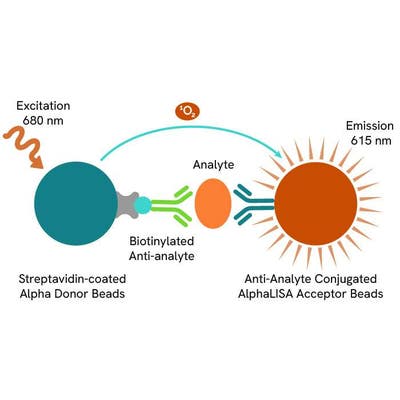

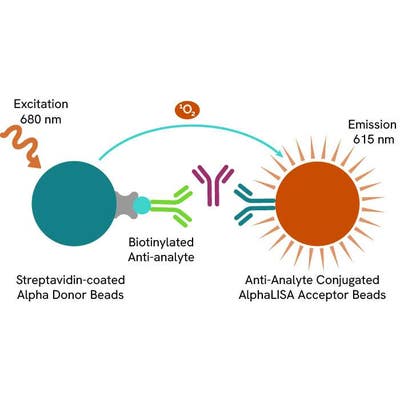 View All
View All
AlphaLISA Human CCL4/MIP-1ß Detection Kit, 500 Assay Points
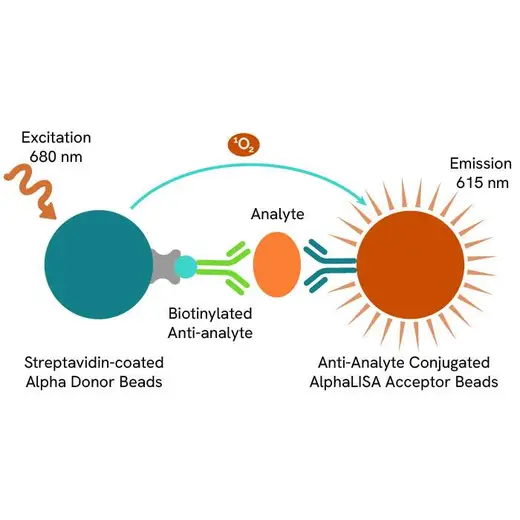

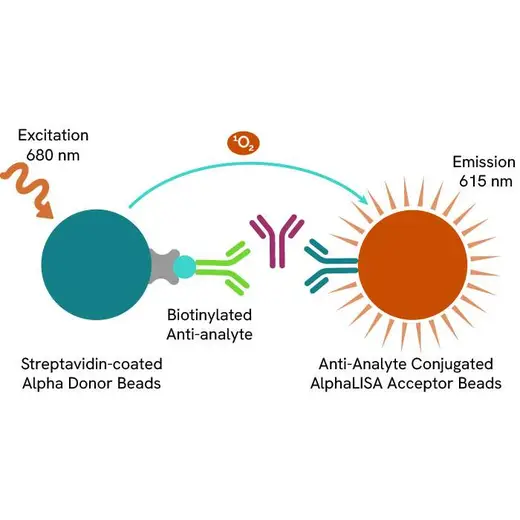




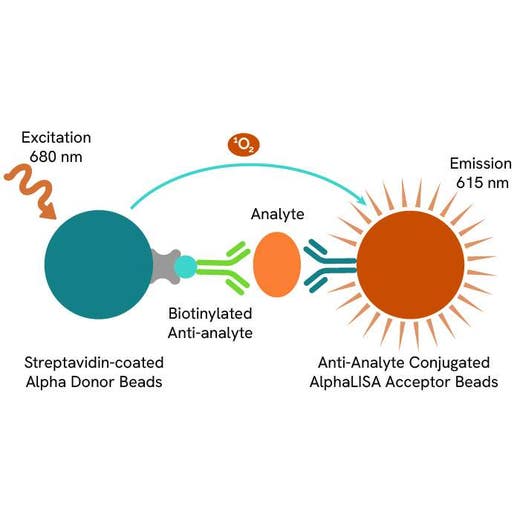

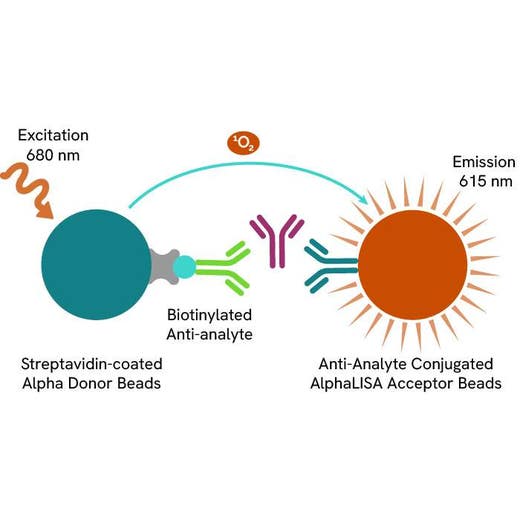




The AlphaLISA™ Human C-C Motif Chemokine 4 / Macrophage Inflammatory Protein-1beta (CCL4 / MIP-1ß) Detection Kit is designed for detection and quantitation of human CCL4/MIP-1ß in serum, buffered solution or cell culture medium in a homogeneous (no-wash steps, no separation steps) assay.
For research use only. Not for use in diagnostic procedures. All products to be used in accordance with applicable laws and regulations including without limitation, consumption and disposal requirements under European REACH regulations (EC 1907/2006).
| Feature | Specification |
|---|---|
| Application | Protein Quantification |
| Dynamic Range | 2.8 - 100,000 pg/mL |
| Limit of Detection | 2.8 pg/mL |
| Sample Volume | 5 µL |
The AlphaLISA™ Human C-C Motif Chemokine 4 / Macrophage Inflammatory Protein-1beta (CCL4 / MIP-1ß) Detection Kit is designed for detection and quantitation of human CCL4/MIP-1ß in serum, buffered solution or cell culture medium in a homogeneous (no-wash steps, no separation steps) assay.
For research use only. Not for use in diagnostic procedures. All products to be used in accordance with applicable laws and regulations including without limitation, consumption and disposal requirements under European REACH regulations (EC 1907/2006).







AlphaLISA Human CCL4/MIP-1ß Detection Kit, 500 Assay Points







AlphaLISA Human CCL4/MIP-1ß Detection Kit, 500 Assay Points







Product information
Overview
Formats:
- Our 500 assay point kit allows you to run 500 wells in 96-well or 384-well format, using a 50 µL reaction volume (5 µL of sample).
- Our 5,000 assay point kit allows you to run 5,000 wells in 96-well or 384-well format, using a 50 µL reaction volume (5 µL of sample).
Features:
- No-wash steps, no separation steps
- ELISA alternative technology
- Sensitive detection
- Broad sample compatibility
- Small sample volume
- Results in less than 3 hours
- Half the time of an ELISA assay
C-C Motif Chemokine 4 (CCL4), also known as Macrophage Inflammatory Protein-1beta (MIP-1ß), is a 69 amino acid chemokine signaling through the CCR5 receptor. It is a chemoattractant for natural killer cells, monocytes, and a variety of other immune cells. CCL4 is also an important regulator of macrophage migration. CCL4 is rapidly synthesized by activated T cells, B cells, and monocytes. It is also produced by neutrophils after adhesion to the laminin contained in the basement membrane of blood vessels. It is one of the major HIV-suppressive factors produced by CD8+ T-cells and has been reported to show a direct antiviral activity against HSV-1. Recombinant CCL4 also induces a dose-dependent inhibition of different strains of HIV-1, HIV-2, and simian immunodeficiency virus.
AlphaLISA technology allows the detection of molecules of interest in a no-wash, highly sensitive, quantitative assay. In an AlphaLISA assay, a biotinylated anti-analyte antibody binds to the Streptavidin-coated Donor beads while another anti-analyte antibody is conjugated to AlphaLISA Acceptor beads. In the presence of the analyte, the beads come into close proximity. The excitation of the Donor beads causes the release of singlet oxygen molecules that triggers a cascade of energy transfer in the Acceptor beads, resulting in a sharp peak of light emission at 615 nm.
Specifications
| Application |
Protein Quantification
|
|---|---|
| Automation Compatible |
Yes
|
| Brand |
AlphaLISA
|
| Detection Modality |
Alpha
|
| Dynamic Range |
2.8 - 100,000 pg/mL
|
| Limit of Detection |
2.8 pg/mL
|
| Product Group |
Kit
|
| Sample Volume |
5 µL
|
| Shipping Conditions |
Shipped in Blue Ice
|
| Target |
CCL4
|
| Target Class |
Cytokines
|
| Target Species |
Human
|
| Technology |
Alpha
|
| Therapeutic Area |
Inflammation
|
| Unit Size |
500 Assay Points
|
Image gallery






AlphaLISA Human CCL4/MIP-1ß Detection Kit, 500 Assay Points






AlphaLISA Human CCL4/MIP-1ß Detection Kit, 500 Assay Points






Video gallery

AlphaLISA Human CCL4/MIP-1ß Detection Kit, 500 Assay Points

AlphaLISA Human CCL4/MIP-1ß Detection Kit, 500 Assay Points

Resources
Are you looking for resources, click on the resource type to explore further.
Cytokines play a vital role in both innate and adaptive immunity and are known for their ability to exert diverse functions on...


How can we help you?
We are here to answer your questions.






























